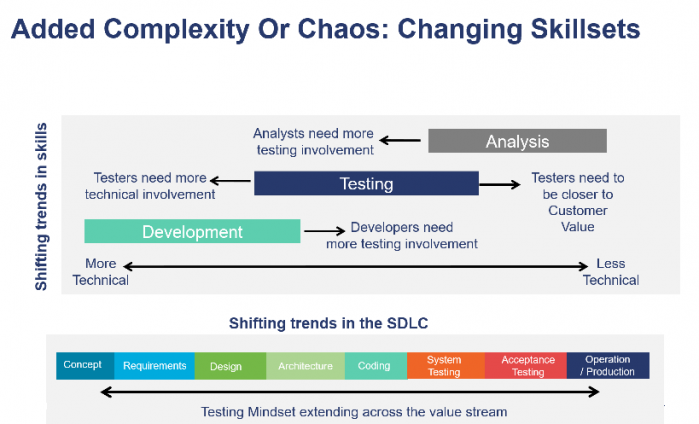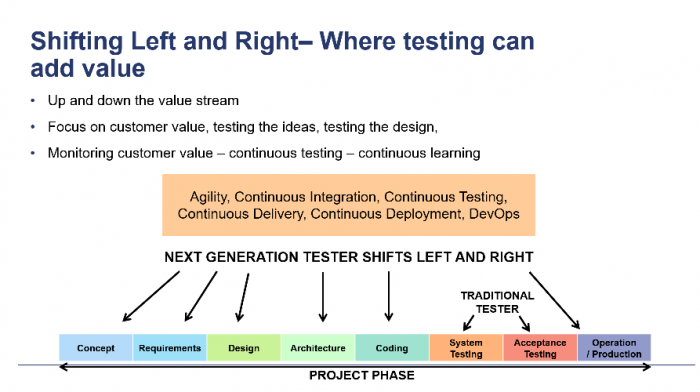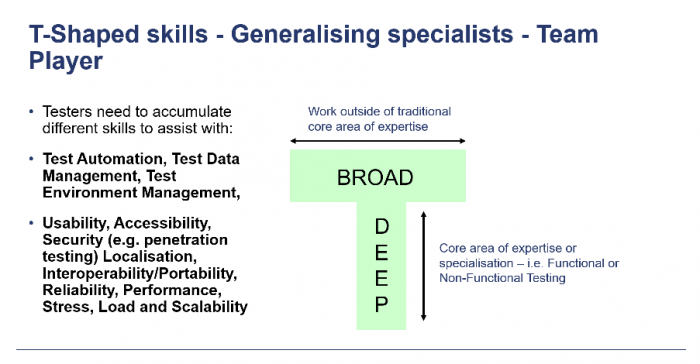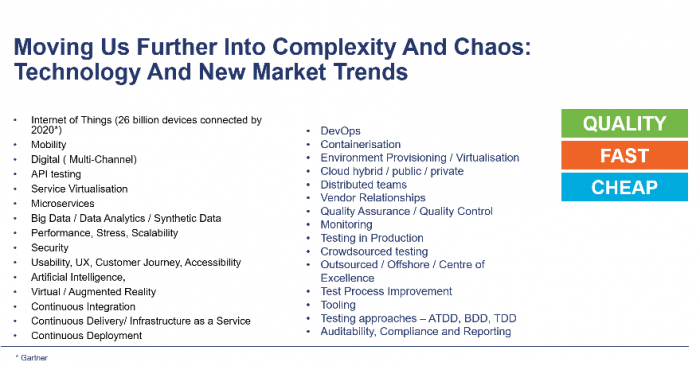Tester – Specialist Title or Generalising Specialist?
Are you someone who has spent years as a manual tester, following a familiar testing process, using a tried and tested set of techniques - the result of years of specialisation; perhaps you were a test analyst or a ‘QA’ or you took on a similar role in a previous life and you were clear on the part you played within a project team?
Or are you someone who has many skills that complement the team; a generalising specialist who has heaps to offer plus a healthy attitude and aptitude to learn? It is likely that you are both a tester and a generalising specialist – but the label you use to describe your role limits you in some way. Are you used to deferring to another party to solve an issue outside of your remit?
Agile approaches require cross-functional, multi-skilled people rather than specialist ‘resources.’ Resources imply that they can be taken from one project team and deposited on any other project when required. ‘Multi-skilled person’ implies that you have a portfolio of skills that can support the team to get things ‘done’ without having a specific label based on your specialisation.
I believe that adopting a title, for example ‘test analyst’, constrains a person to work within the confines of their specialisation, compartmentalising the role, creating a silo and a potential bottleneck due to the skills being specific and limited to an individual’s role.
Different titles that still exist within working groups might include: a business analyst or an automation engineer or a test analyst or a developer – this ‘title’ mentality, I feel, locks you in a box – even though you can add value in so many other ways. However, if it isn’t in your title / job description then you are less likely to aspire to think outside the box.
This also means that by subscribing to a specific title you are potentially short-changing yourself of a diverse, expansive and exciting learning journey.

Not only that but there’s always a danger that ‘if the only tool you have is a hammer, to treat everything as if it were a nail’ (Maslow). The work we do is complex. Complex problems can’t effectively be solved one dimensionally.
If we consider the role of testing per se, ‘testing’ has shifted left – that is we need to incorporate it at the very beginning of a product’s lifecycle – it has also shifted right in order to figure out whether or not what’s been delivered is fit for purpose and providing value to the user. Testing needs to be continuous and for it to be so then everyone in the team must play a part in testing – as is implied, then everyone has a part to play in just about every other aspect of developing solutions. Having one person ‘owning’ testing spread across the development value stream makes little sense. Everyone in the team needs to have analysis, design, testing, engineering, and maintenance skills.

We often talk about the T-Shaped skills of a team member; and from a testing perspective there’s plenty to learn even within our core area of expertise (depth of knowledge) and outside it (breadth of knowledge). If everyone in the team starts with their deeper knowledge or specialisation and accumulates skills from their peers – then over time we can have truly cross-functional teams. Currently we tend to rely too much on our core area of expertise.

Team members need to help one another out – they need a broad and diverse set of skills that include using tools as well as using their intuition to help provide the customer and or end user with whatever they deem valuable.
Team tasks (work carried out) and outputs (deliverables like documents and estimates) should be minimised so that just the value-add activities are performed in order to create the best outcomes for customers and end users and in turn improve the business viability of a product.
The outcomes for users are seamless, effortless, fit for purpose solutions that require no further thought or effort other than to use the product for the betterment of their lives. That is all. So big picture thinking and empathy for those that use the products must be part of the growing skill set. This means that not just technical (hard) skills but soft skills are needed in abundance; emotional intelligence, critical thinking, systems thinking, lateral thinking are skills that need to be worked on – so that we can constantly ask why is the product valuable?, How can the experience be better? Who is using this product? When will they use it? What are the major flaws? What is the customer saying about the product? Are these questions solely the domain of the ‘tester’ or is this everyone’s responsibility?
From the users’ perspective they want it at the right price (cheap), at the right time (fast) and without flaws (quality). That means that strategic and tactical knowledge of risks, functional and non-functional characteristics need to be surfaced as early as possible. It means that for security, for example, the whole team needs to figure out the what, who, how, when and why of security – then it becomes a whole team problem rather than a dependency on ‘the security person or an external security team?’

Just looking at the various technological trends above is eye-wateringly scary – who is responsible for these tasks, skills, tools – well it can’t be the onus of one individual or role and sometimes it is beyond the realms of the whole team. A community of practice or a guild may offer support and perhaps that is led by a coach or leader who takes the place of a traditional QA manager or Test manager.
Technology advances, marketplace changes, socio-economic changes and customer behavioural changes introduce a plethora of additional disruptions to the traditional views and practices of testing and test management.
The rise of the generalising specialist means that the traditional role of software tester and test manager needs to change - new skill sets are required, handoffs reduced, teamwork and collaboration increased, and testing is shifting left (earlier) and right (even in production) - everyone in the team is responsible for quality- not just one person tests but the team does - in fact the team of the future is very much cross functional and diverse - an array of skills is required not just one specialisation.
As we transition from traditional ways of working to newer ways of working I expect to see the concept of clearly defined titles diminish and the new team member will be just that, a multi-faceted, multi-skilled person who contributes in many ways to the team based on a growing portfolio of skills.
How such competencies are represented in the job market will be a challenge to recruiters, but I believe that this is an exciting time for the modern worker who will no longer be limited by a defined title and enjoy a life-time of learning a diverse repertoire of skills and tools from many different disciplines and thus adding value to any team.
Posted by Toby Thompson
Thank you!
Your details have been submitted and we will be in touch.